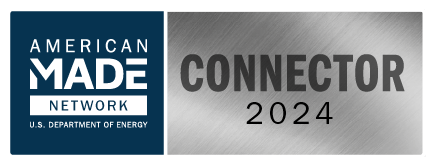You made a conscious effort to wash out that old jar of salsa in the fridge and put it into recycling rather than the trash. You may feel satisfaction when you take your recycling out to the curb, what a shame it would be for that glass jar to end up in a landfill instead of being turned into something new…
Well, it may still end up in the trash. A recent study by the Glass Packaging Institute found that over half of all glass put into single-stream recycling ends up in landfills. Dirty and broken glass is expensive and energy-intensive to fully recycle. This dirty secret is no secret at all, with many waste management companies open and honest about recyclables being buried. Rather than lament, Jacob Kumpon, Jack Lamuraglia and Tanner Wallis, three students with engineering backgrounds saw an opportunity to divert this waste from landfills and at the same time, reduce the carbon footprint of a massive industry.
“It all started with an article we stumbled upon,” Kumpon recalls. “Researchers were mixing crushed glass with concrete in a lab setting to reduce the use of unsustainable materials currently used.”
The trio decided to investigate this idea outside of the lab, scheduling tours of waste management companies around their alma matters, Binghamton and Clarkson University. They were astounded by the amount of glass discarded and knew it could be saved. Beginning in 2019, the founded KLAW Industries, a start-up company that develops and produces glass-infused cement for use in houses, sidewalks, bridges and more.
With $5,000 in prize money from the New York State Business Plan Competition (which they took second place) along with support from Binghamton’s Koffman Southern Tier Incubator and Clarkson’s Cube Incubator, KLAW set out to make some samples.
“We’ve developed a working process and two tons of prototype material,” says Kumpon. “We’ve talked to many customers and determined what they need from this product in order for them to buy.”
This customer-focused product is now being tested by multiple factories in preparation for the critical DOT certification. It was designed to be stronger as well as cost-competitive compared to traditional cement, while having the added benefit of being much more environmentally sustainable.
The start-up was recently accepted into the Southern Tier Clean Energy Incubator (SCI) at the Koffman in Binghamton. SCI provided the team a host of resources including specialized mentorship and funding opportunities. The team hopes to secure grants to ramp up research and development, along with securing a facility in the Binghamton area to increase production capacity.
“We’re looking to restructure what sustainability can be, quite literally,” says Kumpon
Learn more about KLAW at klawindustries.com



